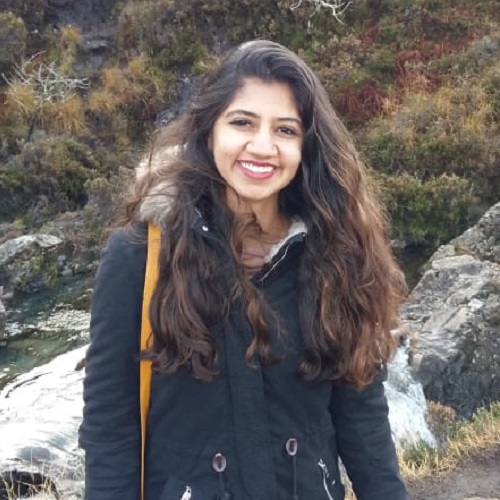Tell us a little bit about your background...
I completed my BA Psychology from Ferguson College affiliated with Savitribai Phule Pune University in Pune, India. I was born and brought up in Pune but currently living in Mumbai.
What inspired you to study your course?
My interest in Psychology peaked during Grade 8, when I read a book about a person with bipolar disorder. Since then, my fascination with the human mind has been ever increasing. The more I tried to understand human behaviour, the more intrigued and curious I became. To find answers to my curiosity, I decided to pursue Psychology.
Why did you choose to continue studying for your MSc Clinical Health Psychology at the University of Strathclyde?
I have had an inclination towards Practice more than Research. However, I recognise the importance of Research to develop basic critical thinking skills. Hence, I wanted a course that had an equal balance between application i.e., Practice orientated as well as Research. Since this course by University of Strathclyde offered that perfect balance, I decided to enrol.
What were the main challenges of studying your Masters?
One of the biggest challenges I faced during the masters was to cope up with all the Research based knowledge and how to conduct scientific research. Until my Bachelors, the focus on Research was minimal. Hence, the foundational knowledge was quite weak. During the Masters, I had to cope and match up to all the other students with their Research expertise. However, with the support of my supervisor, Dr. Susan Rasmussen, I could cope up with the expectations.
What was the best part of studying your programme?
The facilities, access to resources, opportunity to have a hands-on experience through placement and the faculty. It is difficult to identify the best part of studying the Programme. The entire experience was fulfilling. However, if I had to choose an experience, it would be completing my Dissertation. The immense resources and enlightening discussions with the faculty was truly an experience I cherish.
What specialist knowledge/professional skills did you develop whilst studying the course?
Application of theoretical concepts in everyday life in each subject was useful. The Stressbuster placement allowed me to develop my presentation skills and public speaking. The dissertation enabled me to develop skills such as critical thinking, time-management, work-life balance and academic writing. The training in various therapies was particularly helpful as it offered an opportunity to learn the essential skills for a practitioner by trial and error. Along with theoretical knowledge, the programme has helped me develop practical skills to excel in my career.
What have you been doing since graduating?
After graduation, I started practicing as a Counselling Psychologist at a Private Hospital (Fortis Hospital) in Mumbai. Along with providing counselling services to OPD patients, I also offered counselling services to IPD patients such as dialysis patients, patients with chronic illnesses, pre-and post-surgery. I also facilitated over 25 workshops on various mental health related topics to students, teachers, parents and even in Multi-national Companies. Furthermore, I supervised over 15 high school and undergraduate students interning with me. I wrote articles on relevant mental health topics on online blogs and media platforms.
Thereafter, I shifted the focus of my career to Academia. I started working as an Assistant Teacher for Psychology for IBDP and AS/A Levels students. As parallel project, I published a literature review on depression and suicide-related behaviour in adolescence. During my experience in Academia, I sensed students’ increasing interest in research methodology, however, they had no access to proper resources and supervision. To fill this gap, I and my Colleague, curated a programme for high school and undergraduate students to introduce the basics of Research Methodology, and Academic Writing.
What would be your advice for people considering applying for this course next year?
Interact with the faculty and classmates. It is extremely helpful and you may just get a friend for life. Explore all resources and opportunities. Step out of your comfort zone and try new experiences even if you think it doesn’t interest you. I thought Research was not in line with my interests and career path. But after the assessment for Qualitative Methods (where we conducted a small-scale research) and Dissertation, I discovered my passion for research and refocused my career goals from practice to academia.
What do you think of the support available?
The support for students, especially as an International Student was excellent. The Strathclyde Indian Students Association (SISA) was useful as they helped me navigate through the cultural difference and networks to adjust in Glasgow and make it my home. Furthermore, the Mental Health Services are impressive and approachable for all students. The highlight for me was when the faculty extended their support to me and helped me feel comfortable in the new environment.
What are your career hopes for the future?
I have started building my career in Academia. I hope to pursue my PhD and have a successful career as a Researcher and Educator.
How did Strathclyde help you towards achieving your goals?
The Placement for the Stressbusters Programme and the opportunities to explore various research areas helped me discover my area of specialization i.e., suicide prevention, depression and anxiety.
